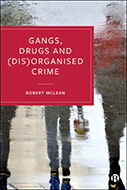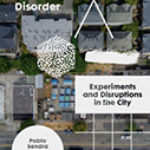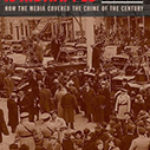Gangs, Drugs And (Dis)Organized Crime

Author: Robert McLean
Publisher: Bristol, UK: Bristol University Press, 2019. 256p.
Reviewer: Russell Crandall | May 2021
As he explains in the preface to his heart-felt book, Gangs, Drugs, and (Dis)organized Crime, Robert McLean, now a professor at Northumbria University in northern England, grew up in anything but an academic family. Rather, he spent his youth in one of his native Glasgow’s most hard-luck and violent “housing estates,”–what we in the United States might call “the projects.” The author explains how in Glasgow at least, “Young Teams” (gangs) are often associated with a neighborhood or district, or even just a block of tenements. Like gang structures the world over, teams become rivals with others outside their localized sphere of influence, or “schemes.” (viii)
Growing up, a Young Team was active in McLean’s neighborhood; almost by osmosis, by his twelfth birthday the young Robert was, tragically, “more acutely aware of Glasgow gangs, membership and territoriality than the average academic.” (ix) By this same tender age, while McLean was not a formally inducted member of the infamous Young Team, it was impossible to avoid its reach. “Like every male in my scheme who hung around in large groups in certain locations, we became a visual reference point for other youths…Even for those who did not hang around, rival outfits would say of them ‘They come from [area X or Y]’ and, at the time, this would be enough to warrant an assault.” (ix)
Reflecting back on his years as an informal but entirely consumed participant in this gang, the author concludes that he and his mates had “simply imitated and sought that which wider society already ascribed to. The only difference is that we attained it, or attempted to do so, via different means, adhering to those social scripts most available to us.” (x) That is, young men all crave status, friendship, sense of masculinity, excitement. If poverty kept you from achieving these in a conventional, acceptable manner, Young Team fighting filled the gap,
By the age of 21, McLean had left his Young Team and embraced Christianity by becoming born again. He also needed at job at this point, leading him to pursue post-graduate studies in criminology, topped off by a doctoral dissertation on Scottish gangs. The latter formed the basis of this fine, courageous book. Reading McLean’s personal account and research reminds this reviewer of the randomness of the luck and context surrounding youths and gangs. Certainly here in the United States, “one zip code over” in an otherwise prosperous, dynamic Sun Belt city like Charlotte or Atlanta can mean the difference between a life a la McLean’s Young Teams and, say, incredible opportunity and resources where the sky is indeed the limit.


